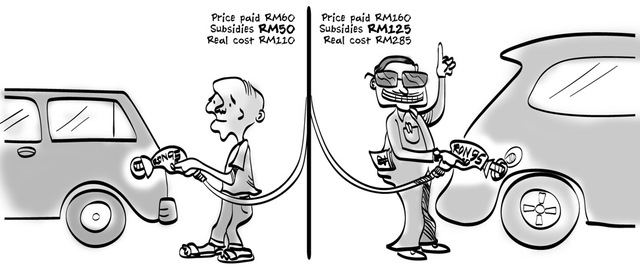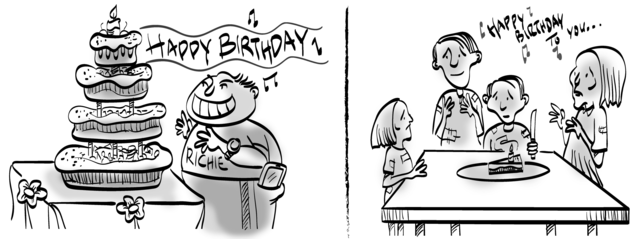By Teh Chi-Chang, CFA
Executive Director
REFSA (Research for Social Advancement)
Friday, 12 October 2012
We write to rebut Dr Lim Teck Ghee’s assertion that “There is little empirical research to back up what has become an increasingly popular line of argument” that blanket subsidies such as for cheap petrol and sugar “benefit upper-class Malaysians who consume much more than their poorer cousins[1]”.
These are the basic facts:
-
The federal government subsidy bill is expected to exceed RM42 billion this year.
-
If we can agree that subsidies should go only to the poor, and we define the poor as the bottom 1/3rd of households, there will be 2.3 million households or nearly 10 million Malaysians[2] who will get subsidies.
-
RM42 billion is enough to give these bottom 1/3rd of households RM1,650 per month – which will more than double their current incomes of RM1,500 per month!
Quite clearly, federal government subsidies are not going where they should. RM42 billion is enough to give the poorest 1 of 3 households RM550 every 10 days, as opposed to the occasional RM500 BR1M payment. Note that in addition to the RM42 billion federal government subsidies, Petronas bears another RM20 billion or so per year in supplying cheap gas to the independent power producers and other industries.
Let’s not fritter away resources on unnecessary ivory-tower analysis. The simple truth is that the bulk of the subsidies goes to cheap fuel which is burnt, and the rich man burns more than the poor. Just ask the average man on a small motorbike how much he spends on petrol and contrast that to what a man driving a gleaming new BMW spends.
Figure 1: Who uses more petrol?

Figure 2: And who takes more sugar?

Cartoons from UMNO-Nomics: the Dark Side of the Budget, Teh Chi-Chang & Johnny Ong, REFSA, July 2012.
Dr Lim also says these subsidies are a “necessary burden” in a “highly skewed capitalist economy like Malaysia”. We would highlight that income inequality in Malaysia remains high [3] despite the quadrupling of subsidies under Dato’ Sri Najib’s administration. The subsidy bill has soared from RM10 billion in 2007 to over RM42 billion today [4].
The massive 4-fold increase in subsidies has clearly not been effective. In their current form, the massive amount spent on subsidies is literally going up in flames, while the vast majority of Malaysians remain lowly-skilled and poorly-paid. 77% of our work-force has SPM-level qualifications, at best; and the bottom 40% of our households survive on RM50 per day [5].
It is in this context that IDEAS (Institute for Democracy and Economic Affairs) and REFSA issued a joint-statement [6] expressing shock at the ballooning federal government subsidy bill [7] and calling for blanket subsidies such as for cheap petrol and sugar to be restructured so that the poor rather than the rich would benefit. REFSA calls for a constructive national discourse on restructuring our subsidy policies. This discourse should centre around 3 main issues:
-
Who should receive subsidies? All Malaysians? Or just the poor and marginalised and other selected groups?
-
How much should they get? Should all Malaysians get the same amount each? Or should the amount be calibrated according to need?
-
In what form should the subsidies be given and should there be a time limit? Should it all be in cash? Or should it be in the form of an enhanced social safety net that includes, for example, housing, child-care, educational, skills-training and micro-financing support? And should there be a time limit for some or all of these subsidies?
It is obvious the existing subsidies are poorly delivered. Even the currently ‘targeted’ subsidies, such as cheap fuel for fishermen are misused as some fishermen choose to sell the fuel and make an immediate profit instead of actually going out to fish [8].
We believe subsidies should be directed towards the most disadvantaged segments of the community, including single parents and the disabled. Let’s work together to identify the disadvantaged groups that require support and craft subsidy policies that meet their needs, with the aim of ultimately lifting as many Malaysians as possible from the need for welfare.
______
[1] REFSA and IDEA’s misplaced focus on critiquing subsidies in the budget. Dr Lim Teck Ghee, 1 Oct 2012. Available at http://english.cpiasia.net/index.php?option=com_content&view=article&id=2419&catid=118&Itemid=162 Retrieved 6 Oct 2012.
[2] Number of households data from Endnote 17 of UMNO-Nomics: the Dark Side of the Budget. Teh Chi-Chang and Johnny Ong, REFSA, July 2012.
[3] Data from the 2009 Household Income Survey shows the Gini coefficient (a measure of income inequality) rising slightly to 0.441 in 2009 from 0.440 in 2007. It is little changed from 0.443 in 1999.
[4] Subsidies have increased dramatically under Dato’ Sri Najib Razak’s administration. Federal government subsidies were just RM10.5 billion in 2007. In 2010, that had doubled to RM23.8 billion; and in 2012 are now more than quadrupled to RM42.4 billion. The federal government projects the subsidy bill to fall to RM37.6 billion in 2013, but this is on the expectation of lower global oil prices rather than due to subsidy reform.
[5] As discussed in Sections 1.7 and 4.3 of UMNO-Nomics: the Dark Side of the Budget.
[6] Budget 2012: The shocking explosion of federal government subsidies. Wan Saiful and Teh Chi-Chang, 28 Oct 2012. Available at www.refsa.org.
[7] The original amount budgeted for subsidies in 2012, as stated in the Economic Report 2011/2012 released last year, was RM33.2 billion. In the latest Economic Report 2012/2013, it is now estimated that the subsidy bill will hit RM42.4 billion in 2012.
[8] For example, fishermen near Sepang buy subsidised petrol at RM1.30 per litre and then sell it at RM1.80. Reported in Fishermen selling subsidised diesel and petrol to others. Stuart Michael, Star Metro, 15 Feb 2012. Available at www.thestar.com.my. Retrived on 8 Oct 2012.

#1 by sheriff singh on Friday, 12 October 2012 - 1:59 pm
When Pakatan takes over the Federal Government, it might be faced with unique situations.
If it then proceeds to give the oil producing states 20% royalties (a substantial sum), then it will have less cash at its disposal to subsidise the various essential goods and services as is the case now. The crucial question then is whether Petronas will have enough cash, after the royalty payments, to transfer to the PR government and if not, how will this PR government then help the poor? From where else can it find the money needed to help the common people survive and enjoy a decent living?
Secondly, consider the possibility that PR wins the Federal Government but the oil producing states are in the hands of the now opposition BN party e.g. in Sabah and Sarawak. Will the PR Fed still give 20% royalty to these Opposition held states? If it does, the BN-ruled states might use the oil royalty money for their own agendas at the expense of helping the rakyat. Then the Federal PR government might have to find ways and means to assist the poor people of these states if it wants to remain in power. Again will it have the means to do so.
Further, should some tycoons with tens of billions of debt or guarantees decide to go under (and this is a real possibility), the PR Fed government will have to intervene to save them else 1Malaysia, or whatever it will be called then, will default and we will become a banana country overnight. The country’s financial position will become more precarious then.
1Malaysians have become very used to the subsidy mentality and any move to remove or reduce this subsidy will needless to say be very unpopular with dire consequences.
What has the proposed PR government done by way of stress tests to see how it is able to govern in the event of calamities? In any event, the incoming PR government is definitely going to inherit a country in deep trouble, financially or otherwise, courtesy of the BN. Hope you are all ready to handle it.